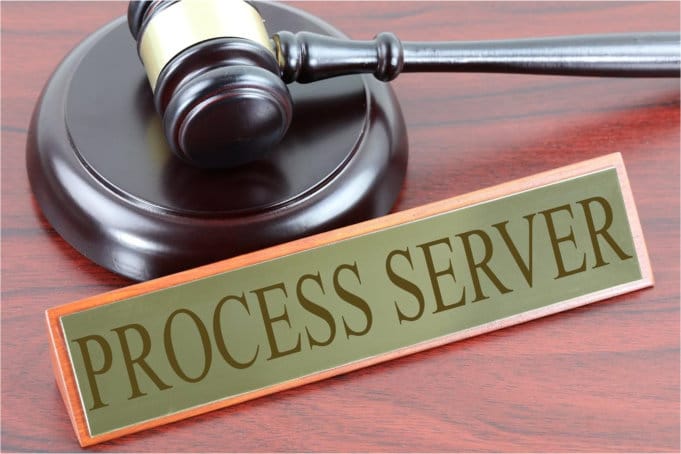The Vital Function of Process Serving in Court and Legal Proceedings
The Vital Function of Process Serving in Court and Legal Proceedings
Blog Article
Comprehending the Value of Process Serving in Lawful Procedures
Refine serving is a fundamental aspect of legal treatments that ensures all parties are educated of their legal rights and obligations. By facilitating the formal delivery of crucial legal documents, it supports the concepts of due process and adds to the honesty of the judicial system. The subtleties of efficient process serving expand past mere shipment; they incorporate legal needs and prospective repercussions of incorrect solution. Understanding these details can considerably influence the end results of lawful conflicts, prompting a more detailed examination of the practices that underpin this vital function.
Definition of Refine Serving
Refine serving is a crucial component of the legal system, specified as the formal distribution of legal records to people associated with a court situation. This procedure guarantees that all parties are properly informed of lawsuits being taken against them or to which they are a celebration. Commonly, these papers include summons, complaints, subpoenas, and other court-related papers that require the recipient's attention and action.
The value of process offering lies in its duty in supporting the concepts of due procedure. It ensures that people have notice of lawful process, thus offering them an opportunity to react or protect themselves. Proper service of process is not merely a step-by-step procedure; it is a fundamental element of ensuring justness and transparency in the judicial system.
Process offering can be conducted by numerous people, consisting of professional process web servers, police officers, and even lawyers, depending on administrative laws. Each technique of service has its very own standards and practices, which are essential to stop delays or dismissals within the legal structure. Recognizing the definition and function of procedure offering is essential for all stakeholders involved in lawful process.

Legal Requirements for Process Serving
Legal needs for procedure offering are vital to make certain that the distribution of legal records complies with developed procedures and is acknowledged by the court. Each territory has certain regulations regulating how and when files have to be offered, which may consist of summonses, subpoenas, and grievances.
Commonly, process web servers have to be objective 3rd parties who are not entailed in the situation. They have to likewise abide by state policies relating to service methods, which can consist of personal service, alternative service, or service by mail. Individual service entails supplying files straight to the recipient, while substitute service permits shipment to an additional liable individual at the recipient's residence or business.
In addition, process-server are typically called for to submit a proof of solution, a legal paper that confirms the delivery of papers, with the court. This file consists of details such as the day, time, and method of solution, as well as the name of the person served.

Function in the Justice System
A crucial part of the justice system, process offering guarantees that individuals involved in legal proceedings are properly informed of activities taken versus them (Process Serving). This formal notice is critical for upholding the principles of due process, which mandates that parties have the chance to reply to claims made against them. Without efficient procedure offering, the legal system would certainly be made inadequate, as people could participate in actions without recognition of pending lawful issues
Process servers offer a crucial function in safeguarding the honesty of the lawful process. They work as neutral events, providing legal records such as summons, complaints, and subpoenas, therefore promoting openness and responsibility within the judicial framework. By ensuring that all celebrations are educated, procedure serving helps to stop any type of potential unreasonable advantage, allowing for equitable engagement in lawful procedures.
Furthermore, the professionalism and trust of process-server adds to the public's rely on the justice system. Their adherence to legal criteria and moral methods strengthens the authenticity of the judicial procedure. Inevitably, effective process offering is important in promoting the policy of legislation and guaranteeing that justice is accessible to all people associated with lawful disagreements.
Effects of Improper Solution
The consequences of inappropriate solution can considerably threaten the integrity of legal process. Improper solution can result in the accused not being conscious of the legal activity against them, which might stop them from reacting suitably or providing their protection.
In addition, inappropriate solution can make court orders and judgments void, requiring the complainant to reboot the process, which can be both economically burdensome and time-consuming. It can likewise unlock to challenges and appeals, as the defendant might argue that they were not effectively alerted of the proceedings, complicating the legal landscape even more.
Best Practices for Effective Service

2nd, timing plays a crucial function. Offering records quickly can avoid delays in legal process and make sure that all parties are informed in a prompt way. In addition, employing a professional process server can improve effectiveness, as they are educated to guarantee and navigate prospective obstacles conformity with regional laws.
Third, keeping exact documents of the solution procedure is critical. If conflicts develop pertaining to visit our website whether service was correctly carried out., recording the date, time, and way of solution can offer important proof.
Conclusion
Finally, procedure serving is an essential part of lawful procedures, making certain that all celebrations are duly informed and paid for the opportunity to react. Sticking to legal requirements and best techniques not only promotes the concepts of due process however additionally reinforces the stability of the justice system. The effects of inappropriate solution can bring about significant delays and complications, highlighting the necessity for reliable procedure serving in advertising justness and availability in lawful disputes.
The subtleties of reliable process serving extend past mere delivery; they encompass legal demands and potential repercussions of improper solution.Process offering is a critical element click site of the lawful system, specified as the formal delivery of legal records to people involved in a court situation. Without reliable procedure serving, the legal system would be provided inadequate, as people could involve in actions without recognition of pending lawful issues.
Process web servers serve a crucial role in securing the integrity of the legal process - Process Serving. The effects of inappropriate solution can lead to considerable delays and difficulties, highlighting the necessity for efficient procedure offering in advertising justness and availability in Related Site lawful disagreements
Report this page